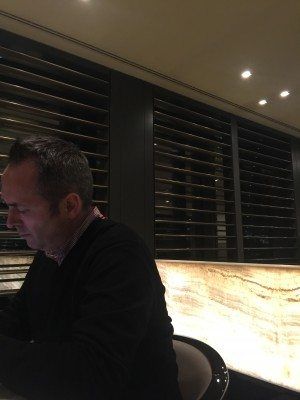Dinner with Microsoft’s CHIEF STORYTELLER
|Gianluigi Ricuperati
In a zillion-platform media environment, corporate communications are replaced by multidimensional storytelling. 032c’s GIANLUIGI RICUPERATI sits down with the man who controls how a personal computing superpower speaks.
I run a design school, and I’m worried about tomorrow’s job landscape. So I’m always interested in new intellectual métiers, and new ways to shape the future of what we could call a designer, well beyond the wonderfully functional art of creating forms for interiors and furniture. A polyphony of definitions exists today: strategic design, process design, social design, policy design.
That’s way I was intrigued by the possibility of meeting Steve Clayton, the Brit now working in Seattle as Chief Storyteller of Microsoft. He is living proof that big corporations and the future of capitalism itself are going to welcome the arrival of narrative designers: those able to choose the best words, the storylines that set things right, and able to do what great fiction storytellers always do – change the world by telling a transforming parable.
Corporate storytelling is obviously an ambiguous and problematic issue, and not at all a novelty: Etsy has one, Nike has had one since the late 1990s, and Mohsin Hamed, author of The Reluctant Fundamentalist, is even chief at Wolff Olins.

What’s changing now is the speed and the all-pervading nature that characterize this particular way of dealing with reputation: In the aftermath of the digital revolution, corporate storytelling is becoming more and more an immaterial, even somehow spiritual activity. A sort of primal act of creation for all the basic material that will later inform the very different acts of communication of each company. In a time where it is commonplace to speak about companies ultimately aiming for evangelization, the chief storyteller’s office is the original miracle room – the place where the first bits of wonder start their descent into the great big world of consumers and onlookers.
It’s also disquieting and uncanny, naturally, as we’re facing a new age of corporate fictions. That’s exactly why it is crucial to begin a public discourse on these new jobs that could shape our cosmos, as a dialectic, pluralistic village of different – and conflicting – stories, instead of a monolithic condominium of voices that are, in the words of monolithic corporate jargon, “on the same page.”
We talked about artificial intelligence and journalism, Apple and rivalry, Africa and England, soccer and revolutions. Our meeting took place on a quiet spring evening over dinner, at the restaurant of the Armani Hotel in via Manzoni. We spoke about one of the most interesting topics of our time in a bleak space of sad luxury: here is an edited excerpt of the conversation.
How did your work with Microsoft start?
I was working at Microsoft in England in a totally different position and I started a blog about eight years ago called Geek in Disguise, where I tried to tell stories about Microsoft from within the company. It wasn’t my day job, totally a hobby because I wanted to change the perception of Microsoft and naively thought I could do it via a blog. Over the years, the blog gained notoriety and good following. Then, about six years ago, the head of Microsoft’s global communications team phoned me at home in London on Tuesday evening to offer me a job as chief storyteller for the company. With no formal background in PR, journalism, or communications it was quite daunting to be surrounded by communications experts. But it seems to have been a success as I am still here and no longer do storytelling on my own. I moved to Microsoft’s Seattle HQ and now manage a team of 25 or so people who help tell stories inside and outside of Microsoft every day. We built an award-winning website and help deliver all kinds of stories through large events with our CEO, Satya Nadella, like a collection of short science fiction stories.
If Microsoft was a children’s story, what would it be?
It would be a story about a collection of wizards who live inside a castle. They’d invent amazing things that would change people, entertain people, and be the source of progress to many people. But nobody would know where these magical inventions came from, until one day, they invited people inside the castle and showed them around while on the same day, the wizards went outside the castle and saw the impact of their work and we’re moved to return and create more, whereupon they met their guests and celebrated over a giant feast.
“If Microsoft were a children’s story, it would be about a collection of wizards who live inside a castle. They’d invent amazing things that would be the source of progress to many people, but nobody would know where these magical inventions came from.”
Did your department contribute to the change of perception of Microsoft in the public mind?
In many small ways, yes. There are lots of other contributory factors, like innovative products, but all these details come together to slowly shift perception. It doesn’t happen overnight, as it’s like turning the proverbial tanker – it happens slowly, slowly, slowly. And then all at once.
What would you suggest to someone who wants to do your job?
Be curious. About life, about finding stories where others may not expect to. Be prepared to be fired. I say to my team if you’re not doing something that almost – almost – gets your fired once a year, you’re really not trying hard enough. This mantra has served me well in my career: never intending to get fired, of course, but always being prepared to push the boundaries and challenge conventional wisdom of what’s possible. I once put a cartoon about Microsoft on a limited edition run of wine bottles. I thought for a moment it’d get me fired, but instead it got attention, changed perceptions, and I learned a lot from it. Be passionate. If you have passion for the topic, it will carry you a long way. Become the world expert on whatever it is you are passionate about. People will notice.
Can you give a good example of a story your group worked on lately?
My favorite story of the last year took place on July 29th, 2015. The day we launched Windows 10. Against convention we launched it with our CEO from rural Kenya and focused on the impact we can have to help empower everyone on the planet. We told a story about Microsoft working with local entrepreneurs in Nanyuki, Kenya, to bring Internet connectivity to that village and change people’s lives. Kids from Nanyuki are going to university for the first time because of this work. Farmers are improving their livelihoods because of this work. A region is being changed for the better because of an innovative technology we invented that uses TV radio spectrum to deliver high speed Wi-Fi over long distances at low cost. Now over 200k people in 15 countries and five continents are using this technology. This story moved me.
Credits
- Interview: Gianluigi Ricuperati

